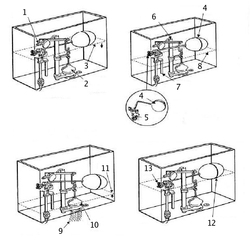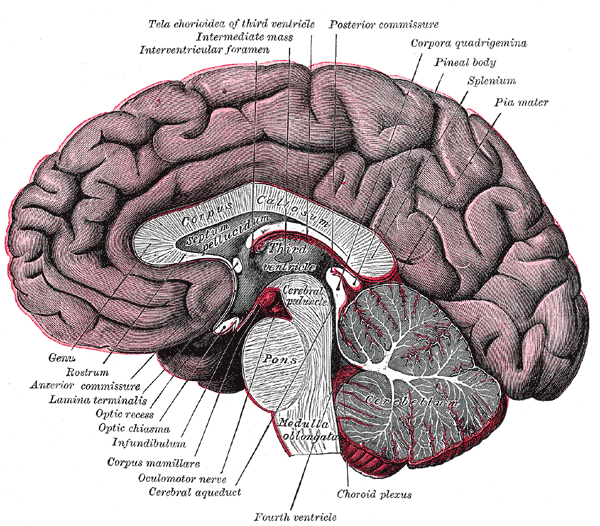“Only along for the ride?” My image for this hypothesis is looking out of the rear window of the bus. The main objection to it is Darwinism. The brain we have is enormously expensive metabolically – and creates SFIK the most dangerous childbirth in nature. It would be contrary to everything we know about evolution to think that such consequential and high-priced developments as the self-aware, reflective brain come about for no adaptive reason.
I see the point, and I'm not saying it isn't enormously useful. The angst alone has resulted in plenty of remarkable achievements. But as a part of a feedback loop, it's hard to think of anything as a driver - even self-awareness. With a lower animal, the stimulus is unreflective and external, and easy to think of as automatic. With humans, it's partly reflective, the stimulus being regurgitated through higher-order thinking processes such as compare/contrast, ordering, mathematics, prediction, etc. We facilitate in our young the development of highly complex identities that integrate all of these skills into an amazingly efficient and sophisticated platform for stimuli interaction. (You should see the way I interact with my children! I kid. I realize this all sounds absurdly cold. But it's only a framework for understanding.)
And yet, sophisticated as it is, there seems no reason to think of it as other than a feedback loop, operating according to laws of cause and effect, constrained by time itself, flowing from past to future. We learn from our past and the future is changed. Our agency in all of this seems entirely dependent upon past events, how our biological systems have integrated external stimuli. The idea of the ego as crate, as I have described it, is an attempt to get at this transcendent notion of the self not as superfluous, or useless - indeed it is the greatest thing ever created in the universe. But rather that it seems, as a thing *of* the universe, a mistake to assume that it is somehow a thing apart.
I'm reminded of the notion that, as creatures of a particular time, space and scale, we are biased to view the universe from a very particular perspective. We see a limited spectrum of light. We feel a particular gravity. We have a particular relationship with atomic particles. Yet, there exists a great range of electromagnetic waves we can't see directly. If we were 100th of our size, our weight would feel very different. If we could experience atoms at the atomic level, we would see a particles made up mostly of space. Our "common sense" experience would be completely different. An everyday example of this is how we still talk about the sun rising and falling, because it makes more *sense* to think of it that way. Relative only to us, it actually is rising and falling.
In this way, it seems we are trapped in a common sense view of consciousness in which we are the final agents of our agency. Yet clearly, we are highly developed beings that have spent years achieving this particular state of agency. And still, there are God knows how many forces (emergent or otherwise) at work on our every thought, pulling strings from deep within our psyche, like the dark matter of space, creating the context within which our thoughts enter our awareness. So how is it that our agency is not simply a manifestation of everything that has thus far come?
But now that we are here, in this final platform configuration, one might ask, are we not free then to go forward, to use all of this sophisticated mental equipment to do our bidding? My response would be: but from where does that "bidding" come? Again, we face the dark matter problem. Any bidding we would seem to choose has to arise from somewhere. And unlike galaxies that appear to have nothing around them, yet seem to exist in some miraculously ordered context, our bidding - our desire to choose - is surrounded not by nothing, but rather embedded deeply within an organic mechanism highly ordered and designed by the complex history of the individual, highly traceable and quantifiable - even to some extent predictable.
But not enough, right? This is the rub. The resolution on consciousness fantastically dim. In theory, by knowing every possible angle and trajectory of every particle one could determine the exact thoughts that might arise. But then you get into quantum problems and problems in constructing a model of emergence itself and it all seems so.. well, hopeless. But in the aggregate, people are incredibly predictable. Psychology, sociology and economics for instance tell us an enormous amount about human behavior. Animal behavior is even easier, right? When specific molecules attach to certain smell receptors, huge arrays of neuronal networks become very predictable. Just because we can't yet make the physical models for this process, can't we pretty safely assume there is a purely physical mechanism at work.
And much of this can be applied to humans. Place a bacon molecule in my nose and I will salivate. So far so mechanistic. Ditto for pornographic imagery. Violence. Food, sex, fear - all pretty simple, so to speak.
And then comes reflection. Consciousness. Higher-order thinking, memory, emotional regulation. While we can measure some of this stuff, the paths become infinitely more complex. Add to this the very real sense we have that we design our own thoughts. However, just because the sun comes up, it does not follow that the sun spins around the Earth. When I eat someone's sandwich from the lounge refrigerator and they get mad at me, I feel guilty. I feel like "I" did something wrong. "I" made a mistake. "I" am useful to myself as a thing, a thing to mold and correct, to improve upon going forward in the world. But whether a dog in a crate, or a spinning gyroscope, am "I" more than a device useful to the platform that is me, yet still utterly dependent on contextual forces that imprint memories? Neuroscience describes the way in which myelin sheaths around neurons serve to reinforce pathways of thought. Apparently they are underdeveloped when we are young, so as to facilitate creative thinking and the laying down of new avenues of thought. Yet as we age patterns become ingrained, and the sheaths thicken. Arterials become freeways. Rudimentary, but another piece of evidence towards a mechanistic understanding of conscious thought.


